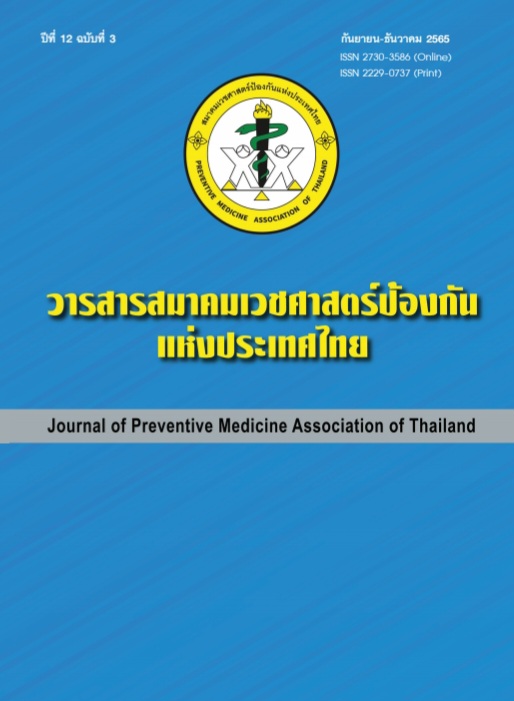Developing Guidelines for Infectious Waste Management with Community Participation in Vichit Subdistrict Municipality
Keywords:
Community infectious waste, Infectious waste management, Community participation, Waste separation, Infectious waste management behaviorAbstract
The objective of this participatory action research (PAR) was to develop guidelines for infectious waste management with community participation in Vichit Subdistrict Municipality, Phuket. There are the community involvement and opportunities for communities and relevant agencies to brainstorm, analyze, plan and operate. The evaluations were structured observations of infectious waste management in 5 communities and a self-questionnaire of knowledge and practice for infectious waste management of 111 personnel with reliability of Cronbach's alpha coefficient at 0.89. The Data were collected from August to November 2022. Data were analyzed qualitative and paired samples t-test. The results revealed that the guidelines for infectious waste management in the community should consist of 2 parts, (1) the community participatory infectious waste management to clarify the roles and responsibilities for infectious waste management of the local government organizations, health promoting hospital, village health volunteers, patients, relatives, and caregivers and (2) the guidelines for managing infectious waste that separation, storage, transportation, and disposal. The results of the evaluation by the observation that most communities and related agencies operate in accordance with the rules and regulations. However, we found the process of separation and storage in some patients, relatives, and caregivers was incorrect. The result of knowledge and practice related to infectious waste management after using the guidelines, almost population had higher mean scores of knowledges and practice related to infectious waste management significantly. Therefore, the community and related agencies should plan and solve problems together in accordance with the roles, duties, and procedures specified for efficient infectious waste management in the community.
References
Chartier Y, Emmanuel J, Pieper U, Pruess A, Rushbrook P, Stringer R, et al. Safe management of wastes from health-care activities. 2nd ed. Geneva: World Health Organization; 2014.
สุเทพ ศิลปานันทกุล. รายงานการศึกษาแนวทางการบริหารจัดการมูลฝอยติดเชื้อของประเทศไทย 2561. นนทบุรี: สำนักอนามัยสิ่งแวดล้อม กรมอนามัย; 2561.
กองประเมินผลกระทบต่อสุขภาพ. รายงานสถานการณ์อนามัยสิ่งแวดล้อมของประเทศไทย พ.ศ. 2563. [อินเทอร์เน็ต]. 2564 [เข้าถึงเมื่อ 10 พ.ย. 2565]. เข้าถึงได้จาก: https://hia.anamai.moph.go.th/th/ handbook/3488#wow-book/.
สำนักอนามัยสิ่งแวดล้อม. แผนขับเคลื่อนการจัดการมูลฝอยติดเชื้อ ระยะที่ 1 (พ.ศ. 2565 – 2570) [อินเทอร์เน็ต]. 2565 [เข้าถึงเมื่อ 10 พ.ย. 2565]. เข้าถึงได้จาก: https://env.anamai.moph.go.th/th/infectious-waste.
สำนักอนามัยสิ่งแวดล้อม. แนวทางการจัดการขยะติดเชื้อในชุมชน. นนทบุรี: สำนัก อนามัยสิ่งแวดล้อม กรมอนามัย; 2562.
รติรส ตะโกพร. พฤติกรรมการจัดการมูลฝอยติดเชื้อในบ้านเรือน กรณีศึกษา อำเภอจอมบึง จังหวัดราชบุรี. [วิทยานิพนธ์ปริญญาวิทยาศาสตรมหาบัณฑิต]. นครปฐม: มหาวิทยาลัยศิลปากร; 2558.
สำนักงานสาธารณสุขจังหวัดภูเก็ต. เอกสารรายงานสถานการณ์การจัดการมูลฝอยติดเชื้อ จังหวัดภูเก็ต. การประชุมคณะทำงานสนับสนุนการบริหารจัดการมูลฝอยติดเชื้อ จังหวัดภูเก็ต ครั้งที่ 1 ประจำปี 2565. 26 พฤษภาคม 2565; ห้องประชุมพระแทวชั้น 5 สำนักงานสาธารณสุขจังหวัดภูเก็ต. ภูเก็ต: สำนักงานสาธารณสุขจังหวัดภูเก็ต; 2565.
Coghlan D, Brannick T. Doing action research in your own organization. London: Sage; 2001.
Cochran WG. Sampling techniques. New York: John Wiley & Sons. Inc; 1953.
Bloom BS. Handbook on formative and summative evaluation of student learning.
New York: McGraw–Hill; 1971.
Best JW. Research in education. New Jersey: Prentice Hall Inc; 1997.
กองกฎหมาย กรมอนามัย. กฎกระทรวงว่าด้วยการกำจัดมูลฝอยติดเชื้อ พ.ศ. 2545. [อินเทอร์เน็ต]. 2545 [เข้าถึงเมื่อ 10 พ.ย. 2565]. เข้าถึงได้จาก: https://laws.anamai.moph.go.th/th/ministry-rule/204273.
อำนาจ ยอดนิล. การจัดการมูลฝอยติดเชื้อในประเทศไทย. [วิทยานิพนธ์ปริญญาปรัชญาดุษฎีบัณฑิต]. กรุงเทพฯ: มหาวิทยาลัยรามคำแหง; 2553.
ประชุมพร กวีกรณ์. การพัฒนารูปแบบการจัดการมูลฝอยติดเชื้อจังหวัดยโสธร. วารสารการพัฒนาสุขภาพชุมชน มหาวิทยาลัยขอนแก่น 2560;5(4):703-28.
ประจวบ แสงดาว. การพัฒนารูปแบบการจัดการมูลฝอยติดเชื้อในชุมชนพื้นที่เขตสุขภาพที่ 4 กรณีศึกษาจังหวัดสระบุรี. [อินเทอร์เน็ต]. 2564 [เข้าถึงเมื่อ 15 พ.ย. 2565]. เข้าถึงได้จาก: https://hpc4. anamai.moph.go.th/th/cms-of-36/download/?did=208309&id=81043&reload.
จอมจันทร์ นทีวัฒนา. ความรู้และพฤติกรรมการจัดการขยะมูลฝอยติดเชื้อในสถานพยาบาลภาครัฐ. วารสารวิจัยสาธารณสุขศาสตร์ มหาวิทยาลัยขอนแก่น 2555;5(3):47-56.
ประจวบ แสงดาว. การจัดการมูลฝอยติดเชื้อในชุมชนในเขตสุขภาพที่ 4 สระบุรี. [อินเทอร์เน็ต]. 2562 [เข้าถึงเมื่อ 10 พ.ย. 2565]. เข้าถึงได้จาก: http://203.157.71.115/ knowledge/academic/ agegroup/view?id=64.
Downloads
Published
How to Cite
Issue
Section
License
Copyright (c) 2023 Journal of Preventive Medicine Association of Thailand

This work is licensed under a Creative Commons Attribution-NonCommercial-NoDerivatives 4.0 International License.
บทความที่ลงพิมพ์ในวารสารเวชศาสตร์ป้องกันแห่งประเทศไทย ถือเป็นผลงานวิชาการ งานวิจัย วิเคราะห์ วิจารณ์ เป็นความเห็นส่วนตัวของผู้นิพนธ์ กองบรรณาธิการไม่จำเป็นต้องเห็นด้วยเสมอไปและผู้นิพนธ์จะต้องรับผิดชอบต่อบทความของตนเอง






